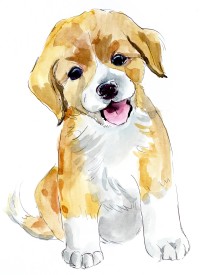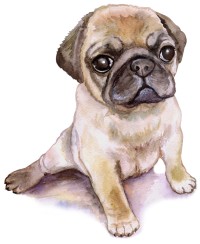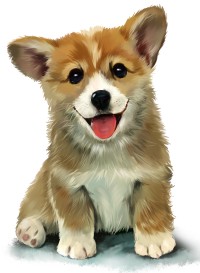Stop Puppy's Nipping and Biting
By Michele Welton, Dog Trainer, Breed Selection Consultant, Author of 15 Dog Books
This article is for mouthy puppies who are mouthing or nipping at you when excited or playing.
This article is NOT for adolescent pups or adult dogs who are actually growling, snapping, or threatening to bite when you do something with them that they don't like.
 Why pups nip and bite
Why pups nip and bite
- Puppies naturally use their mouths to explore the world. They mouth and chew things to acquire information about that object. You need to teach the puppy that he may not do this with human hands.
- Puppies also use their mouths to play with their littermates. When they join a human family, they may not yet realize that the humans are not littermates.
- Puppies with a strong prey instinct use their teeth more than pups with a weak prey instinct. Prey instinct is an inherited compulsion to chase and bite at things that move... a running squirrel, a rolling ball, or your hands and feet. Some breeds have stronger prey instincts than others.
- Puppies who have been roughhoused with often nip and bite more because they have learned to treat your hand as a playtoy.
- Puppies from pet shops often nip and bite more because pet shop employees allowed them to be played with by prospective customers who handled the puppy inappropriately and encouraged him to roughhouse and nip.
- Puppies who were removed from their mother and siblings too early (before 7 weeks old) tend to bite more. This is because a puppy's mother and siblings teach him something very important called bite inhibition.
It works like this: If a puppy bites too hard during play, his mother or sibling will react dramatically, pouncing on the puppy and giving him a good shake or retaliatory bite. If the puppy responds properly to this chastisement by acting contrite, basically saying with his body language: "I'm sorry!" then Mother or Sibling will be satisfied that they have gotten their message across.
In this way, a pup learns to inhibit his biting, to respect other living creatures, and to respond properly to the social signals of dominance and submission. A puppy removed from his mother and siblings before 7 weeks old didn't receive the full benefit of those vital lessons. These pups often end up being mouthy, resistant to correction, or pushy toward other dogs.
Techniques to stop the biting
First, two things you shouldn't do....
 Don't jerk your hand away from the puppy's mouth. Moving your hand simulates a prey animal trying to escape, which can trigger the pup's instinct to grab even harder.
Don't jerk your hand away from the puppy's mouth. Moving your hand simulates a prey animal trying to escape, which can trigger the pup's instinct to grab even harder.- Don't try to "distract" the puppy by giving him a treat or toy... unless he is very young (say up to 8 wks old) or very sensitive. With older pups or vigorous/pushy pups, giving a treat or toy only rewards them for biting. So they will bite more, not less!
Here are the things you SHOULD try
- Return the puppy's bite with a mild "bite" of your own. As he closes his mouth around your hand, leave your hand where it is (I know... those teeth are sharp!) Say "AH-ah" and wrap the fingers of that hand around his lower jaw.
Basically this says, "Okay, you wanted my hand in your mouth, so here it is." Usually a pup quickly decides that this isn't what he signed up for! When he tries to spit out your hand, keep it there for a few seconds, then let go. Most puppies will look chagrined at that point, which demonstrates his recognition that perhaps biting isn't such a great idea after all!
- A similar technique is to keep your thumb inside the puppy's mouth. There is a slight indentation inside his lower jaw, just behind his lower front teeth and under his tongue. If Puppy closes his mouth on your hand, slide your thumb under his tongue and feel for that indentation. Press down – gently! Most pups will now look alarmed and try to spit out your thumb. Keep it there for just a few seconds, then let go.
 You can also use one of the water spritzer or sudden sound devices I discuss in my article on corrections. With a mouthy/nippy puppy, it might be awkward for you to activate these tools yourself; if so, your spouse can do it. Timing is important! Say "No" or "AH-ah" AS Puppy is biting, then spray the water or activate the sound device.
You can also use one of the water spritzer or sudden sound devices I discuss in my article on corrections. With a mouthy/nippy puppy, it might be awkward for you to activate these tools yourself; if so, your spouse can do it. Timing is important! Say "No" or "AH-ah" AS Puppy is biting, then spray the water or activate the sound device.- Another technique is a leash correction. Grasp the leash about 6-12 inches from the pup's collar and lower your hand to the same height off the floor as his collar. Give a quick tug on the leash directly sideways from his collar and parallel to the ground, firm enough to make him let go and reconsider his biting.
- For a persistent pup who won't quit, try this: as he closes his teeth on your hand, say sharply, "AH-ah!" and use the index finger of your other hand to give a stern poke on his shoulder.
Puppy is still biting?
The problem here is not vested in the puppy, but in the correction.
When correcting a puppy for mouthing or nipping, owners often wimp out and give only a half-hearted correction that might work on a very tiny or gentle/shy pup, but not on a confident or persistent biter.
When a corrective technique doesn't work, you have not yet made that correction outweigh the reward (the fun) this particular pup gets from the biting behavior. So, you must either increase the firmness of that corrective technique, or else try a different corrective technique. It is your PUPPY, you see, who will show you what kind of correction he needs.
If the puppy is biting the kids
Well, we need to look at how this can be happening. Puppies should not be loose in the house, and if he's in a crate or pen, he can't be chasing or biting the kids
You say, "He's completely housebroken, so we do let him loose in the living room when we're watching TV, but we keep his leash on." Oh, excellent! Then yes, he could be mouthing or biting the kids in the living room... but then you would have no problem administering a leash correction or activating the water spray or sound device.
You should also consider the behavior of the children. Sometimes owners have unrealistic expectations that a young puppy is supposed to play gently even when the kids are inciting him to play wrestling or chase games. Children shouldn't be roughhousing or wrestling with a puppy. If a child is too young to understand how to play gently, or if the child is older but refuses to follow your rules, you should remove the pup (or the child) from the situation.
When a puppy joins your family, it's natural for him to interact with you in the only way he knows how – with his mouth. But although it's natural, you can't let it continue, or the puppy will continue believing that humans are nothing but littermates. That will lead to a LOT more trouble down the line.
My best-selling books – now available FREE on my website
 Respect Training For Puppies: 30 seconds to a calm, polite, well-behaved puppy is for puppies 2 to 18 months old. Your puppy will learn the 21 skills that all family dogs need to know. Click here to read for free.
Respect Training For Puppies: 30 seconds to a calm, polite, well-behaved puppy is for puppies 2 to 18 months old. Your puppy will learn the 21 skills that all family dogs need to know. Click here to read for free. Teach Your Dog 100 English Words is a unique Vocabulary and Respect Training Program that will teach your adult dog to listen to you and do what you say. Click here to read for free.
Teach Your Dog 100 English Words is a unique Vocabulary and Respect Training Program that will teach your adult dog to listen to you and do what you say. Click here to read for free. 11 Things You Must Do Right To Keep Your Dog Healthy and Happy helps your dog live a longer, healthier life. Get my honest advice about all 11 Things before you bring home your new puppy, because some mistakes with early health care cannot be undone. Click here to read for free.
11 Things You Must Do Right To Keep Your Dog Healthy and Happy helps your dog live a longer, healthier life. Get my honest advice about all 11 Things before you bring home your new puppy, because some mistakes with early health care cannot be undone. Click here to read for free.
